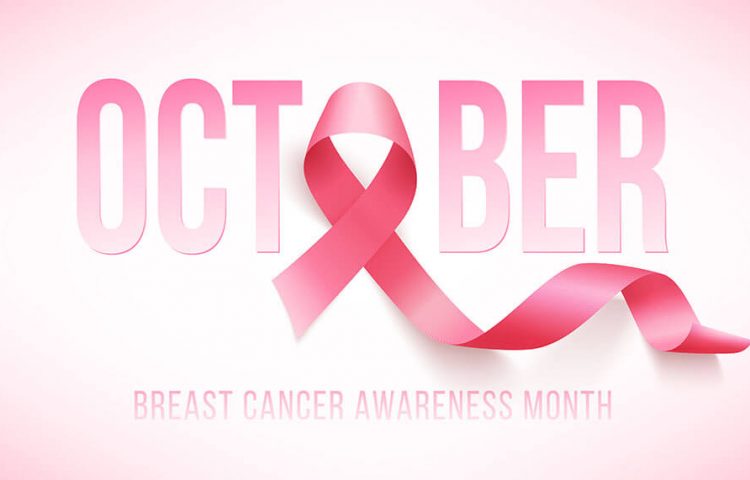October is Breast Cancer Awareness Month, an annual campaign to help bring attention to the disease and raise funds for research into prevention, treatment, and care. Unfortunately many of us are already acutely aware of the disease. According to BreastCancer.Org about 1 in 8 women, roughly 12%, will develop invasive breast cancer over the course of her lifetime. It’s likely that you or someone you know has had or will have breast cancer at some point in their life.
After a diagnosis of breast cancer, women tend to re-evaluate lifestyle and diet choices. Exercise and stress management are crucial to improving overall health and strengthening your immune system, however we believe nothing is more important than a healthy diet. Just as the saying goes “You can’t out-train a bad diet.” you also can’t out-medecine a bad diet. Food is medicine and should be treated with the utmost importance.
There are some general guidelines for a healthy diet that will help to prevent disease as well as support fighting it. None of these suggestions are intended to be magic cures and there are exceptions to every rule. You should always follow the advice of your doctor and nutritionist.
- Increase consumption of whole foods and avoid processed foods
- Avoid GMO & BPA products
- Avoid alcoholic beverages
- Decrease fat intake to below 30% of your daily calories
- Avoid egg and dairy products
- Decrease consumption of animal products
Whole Foods vs. Processed Foods
Whole foods are unprocessed items that have not had components added, removed, or altered. A diet high in whole foods is proven to be the most beneficial for longevity. Fruits, vegetables, and whole grains are known to contain phytochemicals with antioxidant and antiestrogen properties that may prevent cancer. Cruciferous vegetables like broccoli, cauliflower, kale, cabbage, and brussels sprouts are especially rich in phytochemicals. This is just one of these reasons you see so much of them on our menus! John Hopkins Medicine recommends 5 or more servings of fruit and veggies daily and their website provides you with an extensive list of whole foods by plant category.
Processed foods are typically high in added sugars which are known to feed cancer cells. Processed foods also typically contain many chemical additives that can have hormonal impacts. Processed foods should be avoided by everyone trying to live a healthy lifestyle and avoid disease.
Avoid GMO & BPA products
GMO stands for genetically modified organism. GMO foods were created to withstand the widespread use of herbicides and pesticides. The use of GMO crops increased greatly since the 1990’s and are now in more than 80% of processed foods. There is much controversy over whether GMO foods are safe or not. However, there are plenty of reports linking the use of GMO ingredients to cancers, genetic disorders, and digestive disorders. We believe in being safe rather than sorry. All of our soy and corn products are non GMO as well as a variety of other products on our menus.
BPA stands for Bisphenol A. BPA is a synthetic estrogen that is an endocrine-disrupting compound and reproductive toxin. It’s one of the most common chemicals we’re exposed to, being in everything from food containers to dental fillings. Breast Cancer Prevention Partners have compiled a variety of studies that show altered gene expression including cell death, rapid increase in cell formation, and initiation of cancer formation, as well as significantly larger and faster growing mammary tumors when exposed to BPA. All of our canned items are in BPA free cans and all of our Catered Fit meal containers (including desserts, snacks, coffees, and juices) are not only BPA free but most are made from post consumer recycled plastics.
Avoid Alcoholic Beverages
The science is unclear on alcohol’s role in breast cancer development however, alcohol is a fermented sugar and sugar is known to help cancer cells multiply. Alcohol also dehydrates your body, puts stress on your liver, and causes inflammation. For these reasons we suggest reducing alcohol consumption to help prevent and treat disease.
Decrease Fat Intake
Our last suggestion actually checks off a handful of boxes. There are animal and epidemiological studies that suggest trans and saturated fats may initiate the development of breast cancer. Because of this we suggest you reduce your dietary fat intake, specifically saturated and trans fats. Trans fats are mostly only found in prepackaged items like cookies, crackers, etc. and as we suggested earlier, those highly processed items should be avoided. Saturated fats are mostly found in animal products such as beef, lamb, cheese, butter, and eggs. Which ties into our last suggestion of reducing animal products as well as dairy and eggs. These items have not only been found to initiate cancer growth due to the saturated fats, but they are also typically high in cholesterol, antibiotics, hormones, and sodium – a recipe for illness and inflammation.
To take advantage of our suggested dietary guidelines, while taking all the work of recipe reading, shopping, cooking, and cleaning away, simply sign up for either our daily or weekly deliveries and choose meals from all of the tasty meatless options! These are all plant-based, high in whole foods, low in processed foods, and low saturated fat meals that come in BPA free containers. We’re in the kitchen so you don’t have to be!

